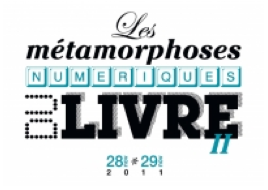On the occasion of its second edition, the 28th and 29th November 2011, the seminar gave the floor to various disciplines specialists, who came to provide their concepts about a matter of which social, economic and technical realities are deeply changing: the digital reading actors, mediums and practices. All these lectures are now available on the website of the ARL PACA, which spreads a synthesis of the nine interventions.
Actual context
Jean-Luc Raymond takes a stock of the current situation of digital reading environments (files formats, reading tools) and analyses the matter of accessibility, practical dimension and compatibility.
Pierre Mounier underlines the various realities of the wording “digital publishing”. He distinguishes digitalisation, digital publishing which doesn’t need printed book, and network publishing fed with shared reading or collective writing. The “revolution” lies in the rewritable nature (Read/Write book) of digital text. This rewritable nature includes two dimensions: a computational dimension (application to the text of computing power), and a reticular dimension: the text can be linked to its environment: intertextuality, multimedia contents insertion, sharing, comments. The fixed structure of the book is upset by digital publishing.
Virginie Clayssen presents a panorama of general literature digital publishing, in France. The digital publishing development upset the book economy in the USA, but the European context is different, especially in France “where publishers have tried to develop a digital book ecosystem more respectful of the freedom reader and of all the balances the book market is standing on”. Platforms of digital distribution (numilog, e-plateforme, Eden) try to develop an alternative circulation of digital books out of the 4 main world actors: Apple, Amazon, Google and Kobo. New practices allowed by digital publishing drove some publishers to lead readers’ community (Red Lemonade and Small Demons for example).
Reading practices, risks and opportunities
Alain Giffard shows a digital reading review as it develops today. The focus logic developed by the book industry divert the cultural practice to a marketing product (recommendation engines represents a big industrial competition). Digital reading involves also a lapse of concentration and cognitive overabundance which make harder to link reading and thinking: visibility problems, taking hyperlinks into account and multitask feature of multimedia environment. Designing of reading as a self-construction is a huge challenge in building a “digital humanism”.
Louise Merzeau talks about memory industrialisation, with the development of available data stock. Digital introduces a culture of track which gives a personal access to information and develops metadata. When attention is becoming rare, “we might think about a forgetting industrialisation as well”.
Olivier Donnat moderates the link between “digital revolution” and reading practices mutations, revealed by sociological studies. Reading is not as much in competition with digital practice as with a “screen culture”, that appeared since the 80s. We also need to distance with the decline of book, which does not mean the decline of reading and writing. While the book lost its symbolic value, the activity of reading is far from disappearing: consultation reading and electronic writing tend to develop.
Christian Fauré proposes its vision of digital reading architecture in the era of cloud computing. According to him, “anonymity and confidentiality are strongly threatened by the new streamlining practices”.
Aurélien Berra showed the “digital classics”. If the mechanics of calculating application to the text exists since the Iliad, Roberto Busa’s journey to the USA in 1949 marks a step in mechanics of calculating application to the classical literature reading. Today, the “digital classics” correspond to a wide field of association, university education which use digital tools to renew scholar practices.
Milal Doueihi, huge defender of the concept of digital humanism, explains why he chose to bring together these two worlds. Digital practices’ spreading introduces deep social and cognitive mutations: effects of mobility, connection to the memory, status of forgetting and imaginary construction of intelligence are upset. Code is a new writing which modifies our connection to written documents.




